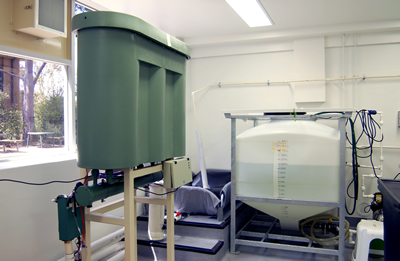GREY WATER
Grey water is the wastewater that is generated from household activities such as laundry, dish washing, and bathing. While grey water is not suitable for drinking, it can be reused for non-potable purposes such as watering plants, flushing toilets, and washing cars. Grey water reuse is an excellent way to conserve water and reduce the strain on our water resources. However, despite its potential benefits, there are currently no standardized guidelines for the utilization of grey water in our homes in Alberta. At present, recycled water cannot be used inside our homes, but can be used for irrigation purposes. Irrigation use is effectively prohibited in metropolitan residential areas due to regulations that require a minimum of 60 meters clearance between inhabited buildings and the reclaimed water. The introduction of recycled grey water use into all residential communities will require new legislation, codes, guidelines and standards.
STANDARDIZED GUIDELINES
The need for standardized guidelines for grey water reuse is essential because it will ensure that the water is being used safely and effectively. Proper guidelines will help homeowners and contractors to design and install grey water systems that meet the necessary safety and performance standards. This will help to reduce the potential risks associated with grey water reuse, such as exposure to harmful chemicals and pathogens.
Standard guidelines will also help to promote consistency and clarity in the design and installation of grey water systems. This will help to ensure that grey water systems are installed correctly, and that they are operating efficiently. Proper installation and operation will reduce the potential for malfunctions, which can lead to water damage and other costly repairs.
Additionally, standardized guidelines will help to educate homeowners and contractors about the benefits of grey water reuse. Many people are unaware of the potential benefits of grey water reuse, and as a result, they may not be willing to invest in a grey water system. Standardized guidelines will help to promote the use of grey water systems by providing clear information about their benefits and how they can be used effectively.
CONCLUSION
In conclusion, the need for standardized guidelines for the utilization of grey water in our homes in Alberta is critical. Standardized guidelines will ensure that grey water systems are designed and installed safely and effectively, promoting water conservation and reducing the strain on our water resources. They will also help to promote consistency in the design and installation of grey water systems, reducing the potential for malfunctions and costly repairs. Finally, standardized guidelines will help to educate homeowners and contractors about the benefits of grey water reuse, promoting the use of these systems and reducing the overall impact of water usage on the environment.
References
References that support the need for standardized guidelines, for the utilization of grey water in our homes in Alberta:
The first two resources provide evidence-based information and guidance on the need for standardized guidelines for the utilization of grey water in our homes in Alberta. They provide information on the potential benefits of grey water reuse, as well as the challenges and policy changes necessary to promote safe and effective grey water reuse in the province. Additionally, they offer specific guidelines for designing, installing, and operating grey water systems, promoting consistency and clarity in the use of this valuable resource.
The last three references provide information on grey water use, a grey water filtration system for your home, and an August 23 CBC article on the present situation with water availability in southern Alberta. Education is the surest form of ensuring results.
Now would be a good time to get off of our best intentions, contact or send an email to our MLA, and request that they develop policies and programs that best serve home-owners, in regards to being able to make use of grey water. The same goes for contacting your local council members.
- The Public Health Guidelines for Water Reuse and Stormwater Use. https://open.alberta.ca/dataset/6a57d29c-d437-4dd9-94e3-d96bedc01bb4/resource/d533afcb-2933-43da-9199-eea030148c00/download/health-public-health-guidelines-water-reuse-stormwater-use-2021.pdf
- There are no regulations or codes in Alberta to ensure that reclaimed wastewater is used safely. The government established a reclaimed water working group to develop regulations, water quality, and technical standards for the safe use of reclaimed wastewater. Reclaimed wastewater from any source cannot be used domestically unless it is approved and meets water quality testing and monitoring by the local municipality. This article was prepared by Alberta WaterSMART. https://watersmartsolutions.ca/wp-content/uploads/2018/08/Greywater-Recycling-and-Reuse-in-Alberta-2011.pdf, and additionally; https://watersmartsolutions.ca/wp-content/uploads/2018/08/Water Reuse in Alberta Final Report_Feb_2015_r.pdf
- Here is an interesting recent video from the Weather Network on grey water use. https://www.theweathernetwork.com/en/news/weather/severe/why-reusing-household-water-to-combat-drought-can-be-tricky-in-canada
- From Greyter’s website: ‘Whether you are addressing water scarcity issues or setting out to achieve LEED, our goal is to provide the most affordable, practical and efficient out-of-the-box water reuse solutions on the market’ https://greyter.com/
- Dwindling water supply indicates how we need to respect and protect our water resources. https.www.cbc.ca/news/canada/calgary/drought-southern-alberta-irrigation-1.6939344
Without a steady supply of water, modern life will grind to a halt. Let’s treat it with the respect it deserves.

